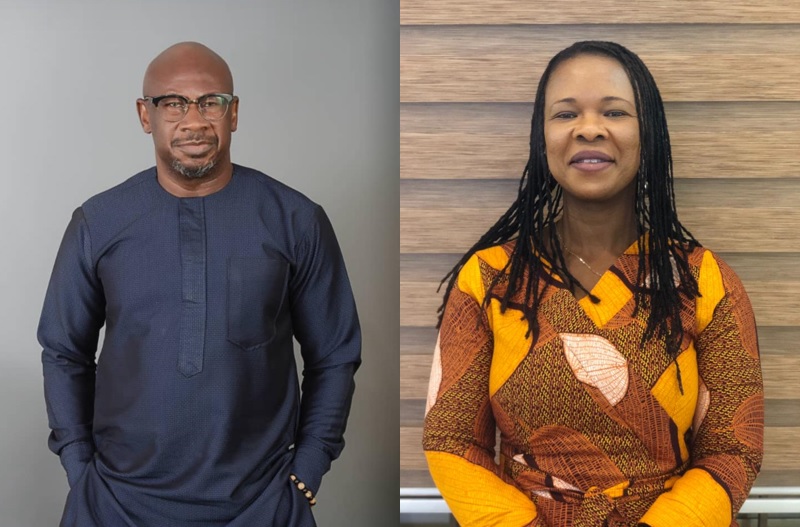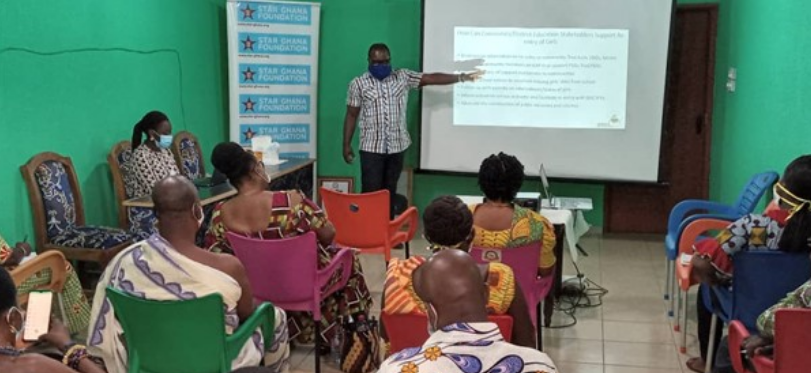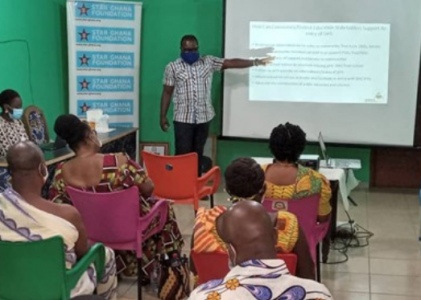In this series of interviews, we will be introducing you to the lead partners involved in Giving for Change! The five-year, €24 million programme will be implemented in Brazil, Burkina Faso, Ethiopia, Ghana, Kenya, Mozambique, Palestine and Uganda, and is led by a consortium of four organizations: the Africa Philanthropy Network, Kenya Community Development Foundation, GFCF and Wilde Ganzen. The aim of Giving for Change – part of the Dutch government’s ‘Power of Voices’ programme – is to foster local giving as an expression of voice, civic participation, solidarity and dissent. The programme will build evidence around new thinking, approaches and leadership that support community philanthropy development.
In 2018, STAR Ghana began a two-year transition from a multi-donor funded programme to an independent Ghanaian-owned and led national entity, called the STAR Ghana Foundation. In this interview, Executive Director Ibrahim-Tanko Amidu and Programmes Manager Eunice Racheal Agbenyadzi unpack the current state of philanthropy in Ghana and consider how the Giving for Change programme will advance philanthropy in the country.

What does community philanthropy currently look like in Ghana?
Tanko: Community philanthropy takes a number of dimensions in Ghana. Firstly, there is community philanthropy that is linked to the social networks and the traditional ways of giving. Secondly, there is the community philanthropy that has been engendered by the presence of NGOs and other civil society organizations that have tried to develop new ways of mobilizing resources for community development. Currently, the traditional system is still quite strong but very focused on addressing specific local issues – like when there is a disaster or acute social issues and appeals for funds are launched to support the affected community or individuals. This has not gone beyond charity or immediate imperative support to address the issues underlying lack of access to quality services.
What does #ShiftThePower mean to you/your organization?
Eunice: When we look at what we stand for and the work that we do, #ShiftThePower means that we support decision making in a way that draws on the power, value and assets of the communities in which we work in. We are looking at different people at the table who have different powers – for example, there are those that are coming with resources and there are those who live in the communities where interventions would take place. Therefore, #ShiftThePower means that interventions that support community voices should be captured and prioritized in any development agenda. Another dimension is about the community being able to co-invest in their own development.
We also do understand the other level of the discussion around #ShiftThePower, where there are interventions around influencing the entire architecture that supports Southern organizations and NGOs. There is that broad discussion about how do we share power in the aid architecture that actually advances the prioritization of community needs and recognizes the role of communities in development. For Sthe STAR Ghana Foundation, prioritizing community voices is fundamental because at the heart of the work that we do is the promotion of inclusive development. When we talk about inclusive development, we are not only thinking about the people we support as beneficiaries but as part of the whole ecosystem of development.
Tanko: The STAR Ghana Foundation is an example of #ShiftThePower because when you look at our history, you will find that we started as a donor programme, a mechanism that was set-up to manage donor funds. However, while operating as a donor programme, we were just implementing the strategic priorities of the donors, even though the sector had some local development priorities. At some point, we realized that if we continued like that, we could not talk of STAR Ghana as a mechanism to promote sustainable and inclusive development. A decision was made to engage with the donors to transition STAR Ghana from a donor programme into a local / national organization – locally-led, locally owned and responding to national priorities. Our vision and mission symbolize the whole notion about shifting power, because at the centre of our work is the promotion of active citizenship and local philanthropy. With active citizenship, we are encouraging and supporting citizens to be active in development while with local philanthropy we are focusing on mobilizing local resources that respond to local needs.
How will the Giving for Change programme help to advance the community philanthropy field or #ShiftThePower in Ghana?
Eunice: There is a need to upscale community philanthropy so as to move away from fragmented interventions of addressing individual needs or one-off disaster issues, to focusing on mobilizing resources for social justice issues and support for civil society. Thus, being part of the Giving for Change programme provides us with an opportunity to build practices and strategies that support the testing and upscaling of different models for community philanthropy. The programme is segmented into different parts that allow us to support civil society organizations with seed funds, thereby testing some specific mechanisms. On another level, the programme will help us to build a body of knowledge on community philanthropy as the programme is being implemented across countries. Additionally, the project will help us to influence an enabling environment for local philanthropy, specifically looking at the legal and institutional frameworks that support giving. It will also help with shifting attitudes of citizens that mostly perceive that development can only happen when external support is available.
How can the Giving for Change programme help encourage donors / INGOs to really shift power and resources closer to the ground?
Eunice: We are engaging with specific institutions like government, philanthropic organizations and bilateral donors, influencing an environment so that it appreciates the role of community philanthropy in development. At the international level, we bring the pieces of work of different countries together and influence bilateral donors and governments to support initiatives that build community philanthropy as well. We are going to be doing that through the research and campaigns we undertake. We do have a strategic partner – the West Africa Civil Society Institute (WASCI) – whose work extends beyond Ghana. Therefore, the learning that will be happening in Ghana will be shared broadly with other countries to influence practices and attitudes of different actors on local giving.
How has aid undermined local giving practices in Ghana and what can the Giving for Change programme do about that?
Tanko: External aid has filled some gaps but, that process has led to a dependency syndrome where we look up to donor institutions for help. Particularly in Ghana, external aid became very prominent during the period of structural adjustment programmes when government was asking for withdrawal from service provision and NGOs were asked to step in. NGOs stepped in and implemented the donor funded projects, but not in an approach that valued local practices. They came in with new practices that said “you don’t have, you don’t know, we are here to teach you and to give you.” Over a period of time that has fostered a mentality where people expect an NGO to come and help even with the slightest problem. This is not just in development projects, but even in the way the government does development where the bulk of its funding comes from external donors. All of this is based on donor priorities and approaches which do not promote that spirit of self-reliance. While the “Beyond Aid” policy that was launched by the current government is laudable, in practice it does not go beyond the substitution of monies to looking at a whole mentality and approach to development. This whole issue of external aid, in a way, was just to enable us to patronize services from the Wests and made us more dependent – which has contributed to our under-development to date. I think movements such as #ShiftThePower and policies such as Ghana “Beyond Aid”, if properly conceptualized and implemented will be great ways of beginning to rebuild – focusing on local resources and strengths.

Any final thoughts?
Tanko: With the Giving for Change programme, we want to begin to change mindsets so that everyone understands that they are responsible for our own development – of course external aid can be utilized but we should be in the driver’s seat. The programme can help to create an enabling environment that supports community philanthropy in Ghana and demonstrates to donors that it is possible to do development differently.
Interview conducted by: Tarisai Jangara, GFCF Communications Specialist

